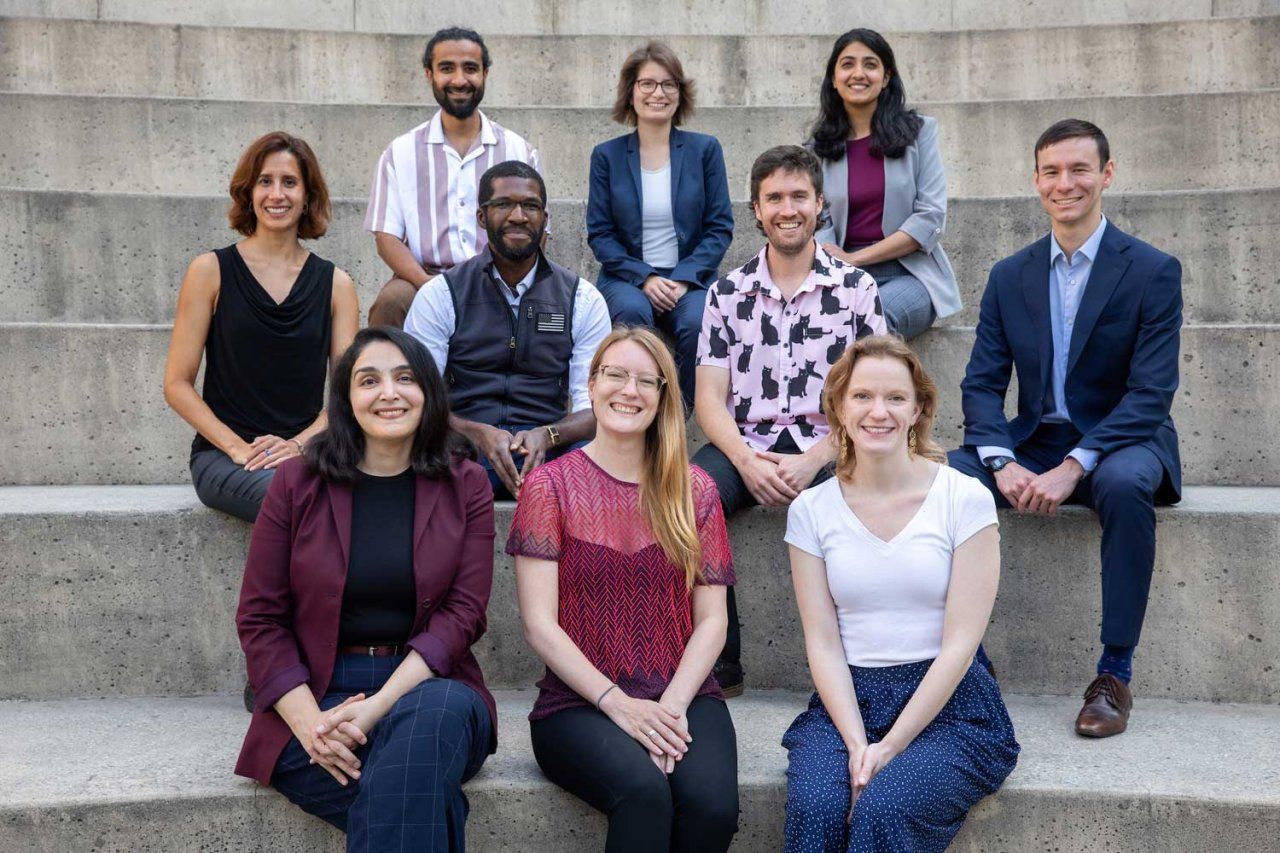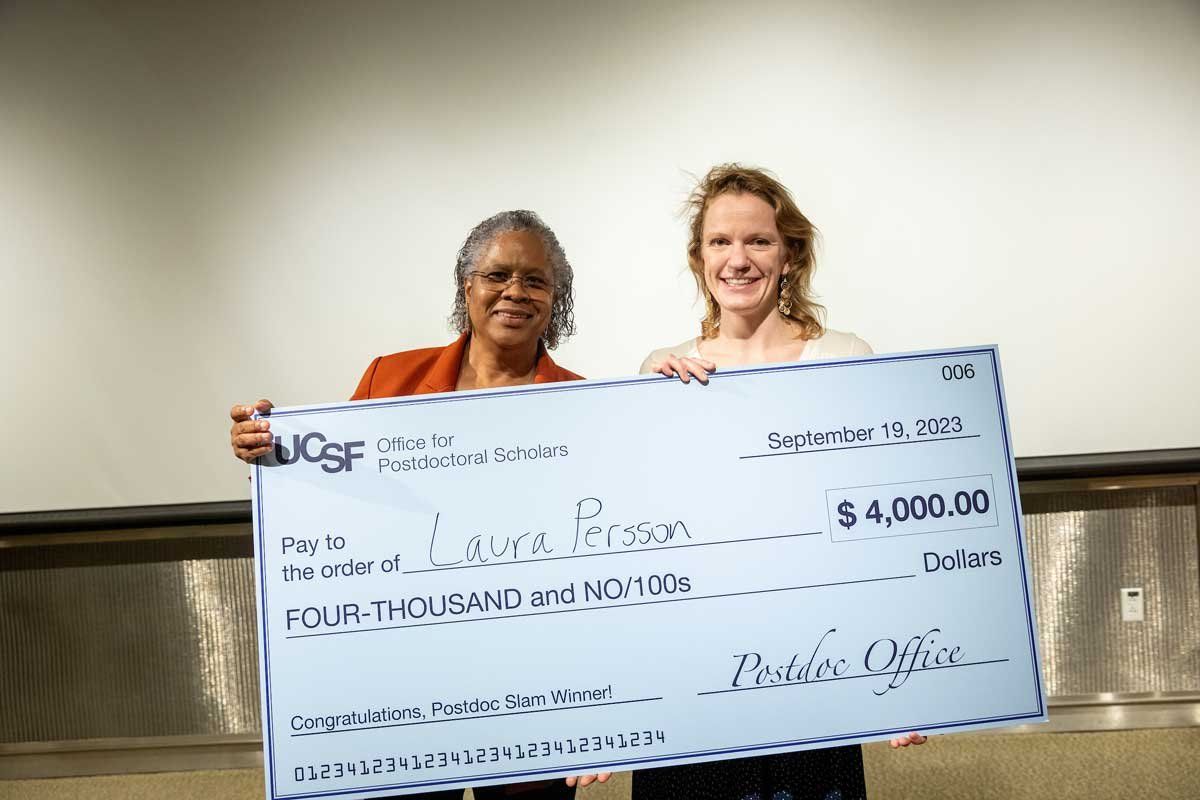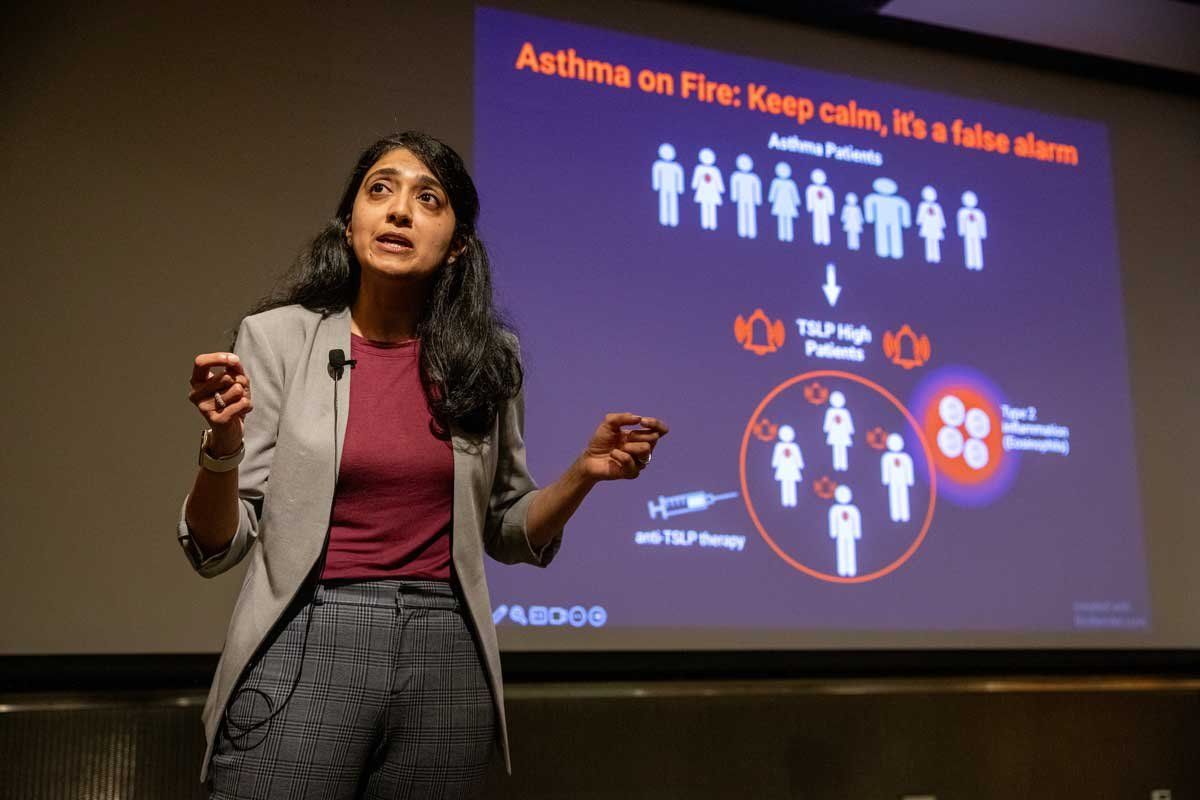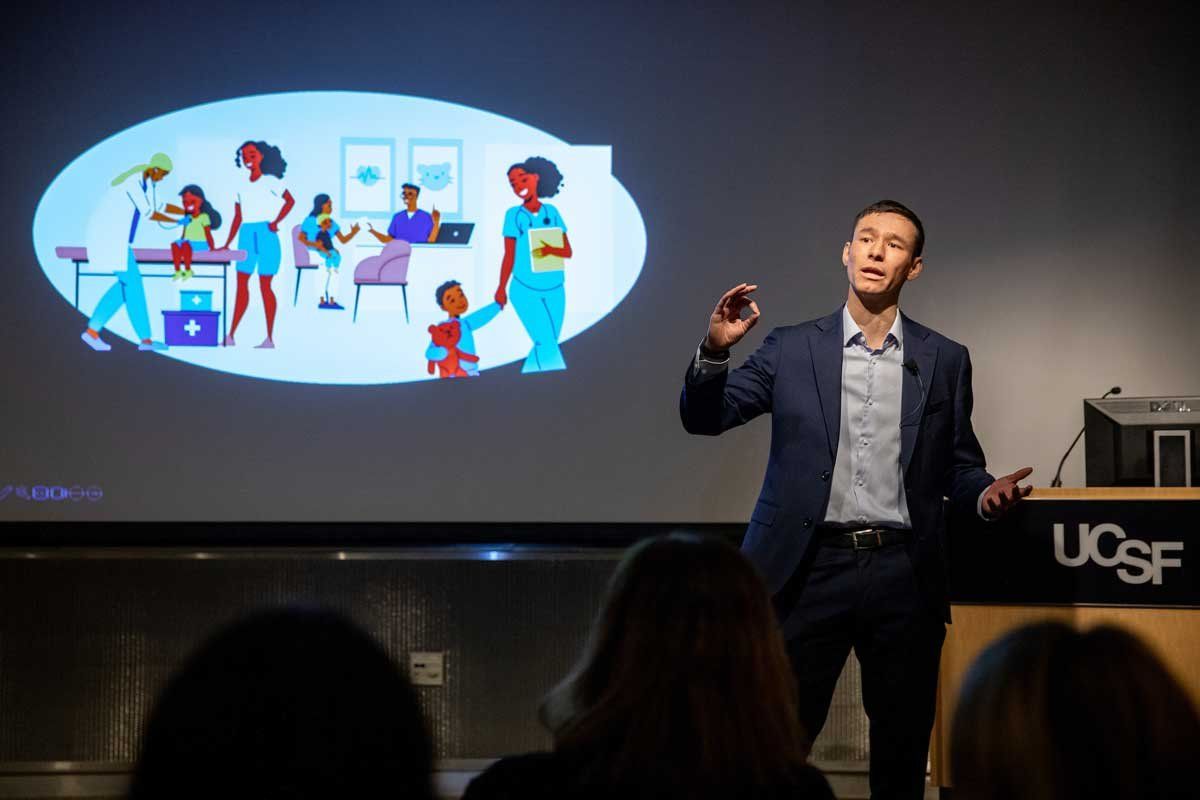‘Wormnado’ Wiggles its Way to Win at Postdoc Slam
Researcher studies worms that seem to organize to hunt in search for insights into human disease and aging.

Late one night, the roundworms inside postdoctoral scholar Laura Persson’s petri dish began to behave strangely after she had closed the container. They started to circle, moving steadily towards the dish’s center. It was perplexing, if not slightly nefarious.
“We [humans] are experts in collective behavior. At the grocery store, we sort ourselves into checkout lines. In city traffic, we merge and yield,” Persson, PhD, told a packed UC San Francisco auditorium earlier this week as part of Postdoc Slam 2023, where she was one of 10 postdoc finalists who presented their research in easy-to-understand three-minute talks to more than 400 people in-person and online.
“While this might feel second nature, it’s a pretty complicated task – luckily, we have 86 billion neurons in our brains to help us,” Persson continued. “Imagine my surprise when I noticed that the tiny worm we work with, which has about 300 neurons, spontaneously self-organized to execute a choreography more advanced than the average high school marching band.”
Laura Presson delivers her three-minute winning talk, “Wormnado: What a Tiny Worm Can Teach Us about Collective Behavior.”
UCSF’s Postdoc Slam is part of a series of events marking National Postdoc Appreciation Week that are organized by the Office for Postdoctoral Scholars, part of UCSF’s Graduate Division.
Slam presenters are judged on their clarity, pace, audience engagement and their ability to avoid scientific jargon. Having received science communication coaching as part of the competition, finalists used metaphors, similes and humor to translate complicated research into engaging talks.
‘Part of our job as scientists is to communicate’
UCSF is home to more than 1,000 postdocs who come to the University from around the world to receive additional mentoring and training following their doctoral degrees. Postdocs play essential roles in USCF scholarly research, often funded by the National Institutes of Health and others in preparation for academic and industry research careers, says UCSF’s new Assistant Dean of Postdoctoral Scholars Chequeta Allen EdD, MBA, FACMPE.
“Postdoc Slam is just the tip of the iceberg in terms of what postdocs are capable of, and we just can’t celebrate them enough,” she said.
Postdoc Slam provides a glimpse of this work, according to Vice Provost of Student Academic Affairs and Dean of the Graduate Division Nicquet Blake, PhD. But it isn’t just about recognizing the next generation of scientists or their work, it’s about equipping them to talk about it, too.
“Part of our responsibility as scientists is to communicate and communicate well to the taxpayers who largely support the research that we conduct,” Blake told the crowd. “The COVID-19 pandemic and the misinformation perpetuated about the lifesaving vaccines has only reinforced how important this is.”
Research adds new word to UCSF lexicon: ‘Wormnado’
Persson’s worm choreography took place in the lab of UCSF Professor of Cell and Tissue Biology Noelle L’Etoile, PhD. The lab uses the tiny worm Caenorhabditis elegans. Because some of its genes are similar to those in humans, the roundworm is often used to research human diseases or conditions like aging. L’Etoile’s lab studies the translucent worms to watch how cellular connections in the wigglers change as they learn, revealing insights into learning and memory that could, one day, foster advances in computing and our understanding of aging.
Still perplexed by the worms marching, Persson did what anyone would. She Googled, searching for “worm vertex” and “possessed worms spiraling.”
“I did some weird searches I would not recommend,” she said during her talk, earning chuckles from the audience. “I did find that Rihanna’s backup dancers once did something pretty similar.”
After months of laboratory research, Persson is still unraveling the phenomena, which she dubbed a “wormnado,” but thinks the elaborate dance may be a hunting strategy. These blind, deaf nematodes were communicating to engage in collective behavior. And the more worms she added to the petri dish the better they got at doing it.
By spiraling, the worms seem to generate a magnetic field, helping them sense conductive materials nearby like the salty bundles of bacteria they consume, Persson told UCSF News. Like a bloodhound uses scent to track its prey, Cenorhabditis elegans may use magnetic fields to find salty snacks in its natural soil environment.

Postdoc Slam winner Laura Persson, PhD, accepts her first place prize for her presentation, “The Wormnado: What a Tiny Worm Can Teach Us about Collective Behavior” and stands with Nicquet Blake, VP of Student Academic Affairs and dean of the Graduate Division.

Second-place winner Kritika Khanna, PhD, gives her presentation, “Asthma on Fire: Keep Calm, It’s a False Alarm.”

Chris Williams, MD, won third prize with his presentation, “Code Blue: Unmasking Racial Disparities in Emergency Triage.”
How this postdoc wormed her way into the judges’ hearts
Persson’s comedic delivery and storytelling earned her first place at UCSF’s 2023 Postdoc Slam with a $4,000 purse. She also won an additional $750 for the People’s Choice Award after garnering the lion’s share of about 440 audience votes.
“If you had been in the judge’s corner, you would have heard us all talking about both the amazing humor of the talk,” said one of this year’s five judges, Helen Willsey, PhD, assistant professor in the Department of Psychiatry and Behavioral Sciences, “but also the phenomenal perspective on a life in science and how fun it is to look in your dish and see something weird.”
Kritika Khanna, PhD, took home second place for her presentation outlining her work to better understand the mechanisms underlying asthma and which asthma patients might be best served by experimental treatments being developed at UCSF. Meanwhile, Chris Williams, MD, won third place, with his work uncovering racial disparities in the triaging of Black, Asian and Hispanic patients in emergency rooms, revealing health care worker’s unconscious biases.
Persson plans to pursue a job in academia after completing her postdoctoral work at UCSF, one day heading up her own lab.
Almost 40% of UCSF postdocs enter the corporate sector after leaving UCSF, while almost half find positions within academia within a year of leaving. For those postdocs who pursue academia, about 4 out of 10 will hold tenure-track positions within five years of leaving UCSF. Many remain in California, helping to make the state a leader in medical and health care innovation.
2023 UCSF Postdoc Slam Finalists
In order the order they presented
Tyler Huycke, PhD
“How the Gut Got its Spots”
Faculty mentors: Zev Gartner, PhD, and Ophir Klein, MD, PhD
Amanda McQuade, PhD
“Speaking to Cells”
Faculty mentor: Martin Kampmann, PhD
Ayush Srivastava, PhD
“Let’s Help You Age Better”
Faculty mentor: Bjoern Schwer, MD, PhD
Hélène Aschmann, PhD
“To Treat or Not to Treat: A Balancing Act in Tuberculosis Prevention”
Faculty mentor: Priya Shete, MD
Kritika Khanna, PhD
“Asthma on Fire: Keep calm, It’s a False Alarm”
Faculty mentor: John Fahy, MD
Biafra Ahanonu, PhD
“The Path to Pain: It’s Not Only in the Brain”
Faculty mentor: Allan Basbaum, PhD
Laura Persson, PhD
“The Wormnado: What a Tiny Worm Can Teach Us about Collective Behavior”
Faculty mentor: Noelle L’Etoile, PhD
Chris Williams, MD
“Code Blue: Unmasking Racial Disparities in Emergency Triage”
Faculty mentor: Atul Butte, MD, PhD
Jay Moltzau Anderson, PhD
“This Stool Is Taken: Harnessing the Power of Poop”
Faculty mentor: Susan Lynch, PhD
The 2023 Postdoc Slam live event judges were Curtis Chinn, MA, science teacher at San Francisco Unified School District’s Galileo High School and producer/host of the “The InfatuAsian Podcast;” Vice Chancellor for Research Harold R. Collard, MD, MS; Vice Chancellor of Communications Won Ha, MA; Genentech Medical Science Liaison and UCSF alum Audra J. Johnson, PhD; and Helen Willsey, PhD, assistant professor in the Department of Psychiatry and Behavioral Sciences.